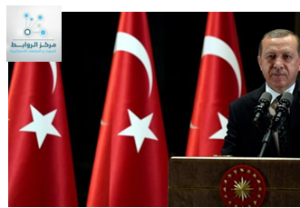The results of the Turkish elections, both presidential and parliamentary, have gained great importance in the international political relations in the Middle East and the Arab world, as they constitute an important turning point in determining the paths of international and regional relations and the positions of the Arab countries towards many of the crises they experienced and the countries surrounding Turkey. Hence , the prominent interest came to follow up the results and the stages and contexts of preparation for it and it did not surprise any one of the observers of the Turkish political issue of the nature of the field action, which was pursued by Turkish President Recep Tayyip Erdogan and his relations with all the spectrums and components of the Turkish people and mutual understanding in drawing steps of the promising future of the Turkish state and historical turning point experienced by Turkey after the events of the military coup that took place in August 2016 and the practical steps that were used by Erdogan to address the real causes that led to the events of the coup and the study of the true reality of the nature of the political orientations of the Turkish modern state .
The importance of the elections and their results will have a great deal of space for Arabs in a new drawing of how to deal with the political crises surrounding the Arab countries and the international and regional situation, which is conflicting with the Turkish approach towards establishing a conscious political system for the Turkish-Arab relations which may come in manner that does not suit international political interests in the Arab region.
Therefore, it is incumbent upon all those who seek to promote these goals and positions, especially after the constitutional change that took place in Turkey and the support it received by most of the Turkish people to transfer from the parliamentary system to the presidential system, which grants the elected president currently broad powers in all political, economic and military fields and aspects and within common interests which the Turkish-Arab relations should be characterized by it and new features and horizons after the recent results of the elections, which we see as follows:
1. To strengthen economic relations and to establish a joint economic system and development programs between Turkey and all Arab countries within the framework of a precise economic development plan aimed at reaching advanced stages of cooperation between all parties.
2. In order to strengthen this strategic economic cooperation, it is necessary to revive a system of joint political action based on a solid basis for building broad relations based on common interests based on a fundamental consideration in uniting political positions towards all the crises experienced by the Arab region and determine the correct paths to address them for the service of all.
3. Turkey’s active role in formulating an Arab-Turkish axis that will identify the most important aspects of common frameworks in promoting Arab-Turkish relations based on the common denominator in the common religious and historical ties that characterize the relations between the two parties.
4. Formulate a clear and comprehensive political vision for all the crises in the Arab countries where the battles, clashes and political conflicts are still representing its field features in Syria-Yemen-Libya and work on finding common ground for a political solution in which the Turks will play a key role in ending these crises and conflicts and finding common position that brings the Turkish-Arab relations back to its known predecessors.
5. The formation of the space and the framework of political relations between the Arabs and the Turks to be clear in its departure from its ideological political framework, that is, that the obstacles and objectives are not interfering which constitute an obstacle to defining the path that expresses the nature of the Arab-Turkish relations, especially with regard to the intellectual orientations which constitute an important basis in the concept of Modern Turkish State.
6. Giving an important and vital aspect in the relations with Iraq, especially after the water problem and the situation in the water file, which began to top the list of common concerns between Iraq and Turkey, after the completion of the construction of the dam “Aliso” , many problems have begun which led to the emergence of many of the obstacles that threaten the future of water, animal and agricultural wealth in Iraq, which necessitates the development of new procedures in the development of balanced and real relations with Iraq in all fields promoted by trade exchange between the two countries, which amounted to more than 12 billion dollars annually.
7. The establishment of a joint Arab-Turkish security system, especially with Iraq, concerning the presence of the Turkish Workers’ Party in the Iraqi territories and the fact that it constitutes an important obstacle and is considered one of the most important problems that disturb the relations between the two countries due to the attacks and aggressions carried out by elements of the Labor Party coming from Iraqi territories.
8. The Turkish presidency has to play its influential role in creating regional political balances and investing its relations with all international and European institutions and creating balanced relations and radical solutions that are in line with the interests of all parties, as happened recently in the Syrian scene and the agreement between Turks and Americans on presence in the Syrian region of Manbij .
Iraqi Studies Unit
Rawabet Center for Research and Strategic Studies

